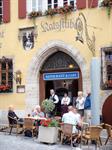WINE AND FOOD TOURISM

In developed countries, almost all regions that produce wine have become involved in the wine tourism boom. Wine tourism involves visiting vineyards, wineries, wine festivals, and wine shows, with the aim of tasting locally-produced wines and learning about wine-making procedures.
Wine tourism almost exclusively takes place in rural areas. The scenery and culture (sometimes called the ‘winescape’) of the regional landscape are important attributes of wine tourism and, perhaps to a lesser extent, of food tourism. Hence, the popularity of scenic wine-producing destinations such as Tuscany in Italy, the South Island in New Zealand, and the Barossa Valley in Australia.
Similarly, food tourism involves visiting specialty food producers and retailers, restaurants and food festivals, with the aim of tasting locally produced foods. It may also involve learning about how foods are produced and then prepared into dishes. Food tourism is also strongly linked to rural areas where speciality foods are grown and produced, but it also takes place in towns and cities where food can be tasted and purchased in restaurants, produce markets, and speciality retailers.
Food and wine package tours are widely available. Many connoisseurs prefer travelling in small groups, with pre-arranged transport and a well-informed guide to show them the pick of the available wine and food destinations. Package tours are generally ‘all inclusive’ with accommodation and local transport included in the cost of the tour.
Other tourists travel independently, arranging their own cellar tours and restaurant visits. Tourism authorities are increasingly providing more services to attract independent tourists to food and wine destinations: the development and promotion of wine and food trails, the construction of regional wine interpretive and visitor centres, and the provision of signage systems in vineyard areas are just some of the services now available to visitors.
Food tourism is closely linked with a sense of place, so while tourists may not select a destination because of its food, that region’s food can be a large part of the appeal and contribute in important ways to the tourist experience. In this way, food can become a part of the visitors’ overall impressions of a place and can help stimulate repeat visits and word-of-mouth promotion of that area. The repercussions of a positive food experience at a destination can also trickle into other areas, such as increasing interest in, and demand for, certain foods at home. If, for instance, a visitor to India enjoys the food, that enjoyment might lead to interest in Indian food at home and hence to a demand for Indian food ingredients or foods in local markets.

In many cultures, eating together signifies a relationship. In the need to eat and our appreciation of good food, we recognise our common humanity, and in savouring the foods of another place or culture, we appreciate our diversity. To eat with relish and appreciation the foods of a visited region, is to partake in the traditions and flavours of that region. Our emotional relationship with food, combined with the human interactions surrounding the receiving and appreciation of food, can make food a particularly potent factor in a tourist experience - one that engages more of the senses at one time, including that sense that is most directly linked to our emotions: smell.
Although wine and food tourism promotions usually target higher income groups, they also marry well with other forms of tourism such as cycling or hiking, back-packing, cultural tourism, etc and they can be accommodated in many different ways. For instance, food tourism can require little more than some directions to good restaurants, to farmhouses, or to market places where one can appreciate good meals. In this way, a region’s tourism may be stimulated and supported as delighted visitors tell others about their experiences.
The success of any food tourism industry generally requires that visitors perceive the food as being ‘authentic’ and expressive of the culture and region visited (though that is not always the case), and that some kind of consistent quality be achieved.
